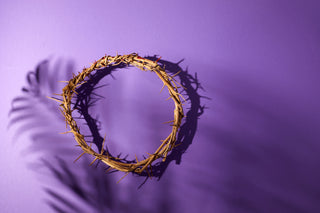The Great Lent is an essential Christian period of repentance and preparation for Easter. Formalized during the First Council of Nicaea in 325 CE, it was observed even before that date.
Find out more about it in our dedicated blog post!
Who should be observing Lent?
Initially, the Great Lent was a time of preparation for baptismal candidates (most of the baptized in the early church were adults) and a period of penance for sinners, which is still the case.
Let's take a look at what the Code of Canon Law dictates: "Abstinence from eating meat or some other food according to the prescripts of the conference of bishops is to be observed on, of abstinence binds those who have completed their fourteenth year of age. The law of fasting, however, binds all those who have attained their majority until the beginning of their sixtieth year."
When is Lent observed?
Following the Church year, Lent starts on Ash Wednesday and ends on Good Friday, right before the Easter Sunday (Palm Sunday). This year it begins on March 2 and ends on April 14. Technically, it lasts 44 days, that is to say, six and a half weeks ca. However, being the feast of Christ, Sundays are not included in the count, which makes the Great Lent a 40-day period.

Ash Wednesday Mass.
How do you observe Lent?
Millions of Christians embrace the spirit of Lent through abstinence, penance, and almsgiving. Instead of giving up on certain foods, some decide to abstain from the use of social media or other postmodern era entertainment, so to train self-discipline and repent in remembrance of Christ's passion.
While for Catholics abstinence from meat extends to all Fridays during Lent, Eastern church imposes decidedly stricter fasting rules — similar to those of the early centuries — which additionally include giving up on alcohol beverage, eggs, and dairy products.

The personification of the Great Lent. Detail of the painting "The Fight Between Carnival and Lent" by Pieter Bruegel, the Elder.
Why do we celebrate Lent?
Lenten season is useful in a number of ways to those who both yearn higher spiritual consciousness and wish to grow closer to God by emulating Jesus Christ's 40-day fasting in the wilderness.

Christ in the Desert. Painting by Ivan Kramskoi.
In Pope Francis' words, Lent is "[...] a favorable time to prepare to celebrate with renewed hearts the great mystery of the death and resurrection of Jesus, the cornerstone of our personal and communal Christian life. We must continually return to this mystery in mind and heart, for it will continue to grow within us in the measure that we are open to its spiritual power and respond with freedom and generosity." (Message of His Holiness Pope Francis for Lent 2020)
And with this in mind, let's dive a bit deeper in Lenten liturgy.
Sundays in Lent
Sundays are central to the liturgical celebration of the Great Lent that covers five of them, each of which has its own Latin name, as follows:
- Invocabit-Invocabit me, et ego exaudiam eum (Psalm 91,15).
He shall cry to me, and I will hear him: I will deliver him, and I will glorify him: I will fill him with length of days.
- Reminiscere-Reminiscere miserationum tuarum. (Psalm 25,6)
Remember, O Lord, thy bowels of compassion; and thy mercies that are from the beginning of the world.
- Oculi-Oculi mei semper ad Dominum. (Psalm 25,15)
My eyes are ever turned towards the Lord.
- Laetare-Laetare, Jerusalem. (Isaia 66,10)
Rejoice, O Jerusalem: and come together all you that love her.
- Judica-Judica me, Deus. (Psalm 43,1)
Judge me, O God, and distinguish my cause from the nation that is not holy: deliver me from the unjust and deceitful man: for Thou art my God and my strength.
The sixth Sunday in Lent, called Palmarum or Palm Sunday, marks the beginning of the Holy Week, and this year falls on April 10. Since Purple is the liturgical color of the Great Lent, please take a look at our Amethyst, Crystal, Leather, and Cord religious accessories to make this Lenten season memorable.
Related Articles:
Lenten Season: a complete guide →
Holy Week: Basic Facts To Know →










